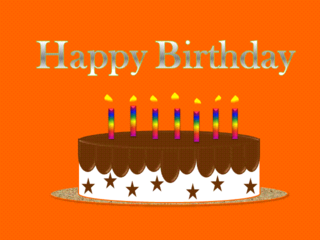Depression
Why Is a Birthday So Sad?
Moms and memories, cards and cupcakes—but mostly, courage saves the day.
Posted September 29, 2018

It all starts on Tuesday, when I go to my friend’s house for lunch. Our mothers were close, and we grew up in each other’s families. She takes care of me in the way that lifelong friends do. She knows that I am about to turn 56, and she provides a celebratory lunch from our childhood, with improvements. We have vegetable soup, not from childhood’s Campbell’s red-and-white can: instead full of recognizable and textured vegetables, and distinct herbs, not just salt. And open-faced grilled cheese sandwiches: the sweet complexity of the cheese light-years beyond a slice of ye olde Kraft American from our mothers’ kitchens. Root beer, now diet without the ick of saccharine. And cupcakes, my favorite dessert, the size of Miami and cascading with frosting, quite unlike our mothers’ modest treats: It would have taken several of theirs to equal the half of one we eat—at least in terms of decadence.

I feel our mothers there with us, though they are both dead now. My mother is always with me on my birthday. I always think of the stories she told me about my birth: how my father drove her to the local hospital in the middle of the night, and left my 7-year-old brother and 4-year-old sister in the back of the station wagon, asking the security guard to keep an eye on the kids for a little while. Ah, the early sixties in a safe small town! When I was actually born, and Mom was coming out of the haze of the era's typical delivery medication, she “counted all your toes, several times, and knew that you were perfect.”
That feeling of Mom’s presence continues over the next few days as I receive beautiful and funny cards, sweet emails, touching greetings on Facebook. I am grateful to be so loved, so cared for—and I'm also sad.
What’s that about? At first, I make the connection with the last birthday card I received from Mom, last year. It was a pretty card, a striking freebie from the International Rescue Committee. When I opened to the message she had written, I burst into tears before I read a word: her handwriting, once so big, open, and loopy, now small, cramped and tight. Fine motor control diminishes; writing becomes hard as we age. She minded that. I found it deeply moving, I suppose because it symbolized the effort she made to do something she had done every year of my life: to write me a birthday card in which she told me how grateful she was for me.
No card from Mom this year, but the yearly ritual echoes in my head. And other people’s messages make me feel connected to the world, blessed by love. The sadness isn’t exactly grief, nor loneliness, and it certainly isn't about the absence of love.
How can I be sad about my birthday?
One obvious answer: I’m aging. Arthritis: I feel old when my hip sends a sharp pain down my leg when I get up in the morning. My hair is turning silver, seemingly by the hour. My new glasses are a lot more powerful than my old ones. The medical assistant tells me I’m half an inch shorter than I used to be, though I’m convinced she’s wrong. Yes, I’m a little depressed that my body is changing, despite my efforts to exercise and eat relatively sensibly. My body is a memento mori, a reminder that I too shall die, like my mother, like her friend, like us all. But in general, aging doesn’t bother me—at least not yet.
Most of the time there's happiness: writing a book is a lifelong goal, now in the process of becoming reality. My life history, which has come into focus with those birthday greetings on Facebook, has been varied and exciting to me. I’m in a good place, doing what I want to do. So why am I sad?
A client comes to see me the day before my birthday, and brings her 2-month-old daughter. Baby Madeleine typically sleeps during our sessions, but this week she’s wide awake, wiggling and cooing as her mother rocks the car seat where she rests, surrounded by playthings that occasionally catch her attention. Mostly, though, Madeleine listens to us talk. Her deep blue gaze is piercing, serious—and then she blossoms into a baby’s slow smile.

After a few minutes, Madeleine has had enough therapy, thank you. I ask her mother if I can hold her while the session continues. Perhaps she’ll regain interest in our work if she can see her mother, who is talking with me calmly and often with pleasure about the changes in her life now that she has Madeleine.
I hold Madeleine for the rest of the session. I feel her warmth against my chest. When she’s restless, I automatically jiggle her and rub her belly. She has booties on, so I can’t count her toes, but I don’t need to do that; we all know she’s perfect. She promptly falls asleep right as we finish talking. Her mother tucks her into the car seat and off they go, back home where, in a few years, Madeleine will be having vegetable soup and grilled cheese.
I have a little break between sessions, and can sit quietly with the beauty and tender attachment I’ve just experienced. I am not sad about not having had a baby myself, although I am very glad that my client has the long-desired Madeleine and is so happy to be a mother.
The next day is my birthday, and also the day of the Kavanaugh hearing with the Senate Judiciary Committee. In between clients, I anxiously watch a few minutes of Christine Blasey Ford’s testimony. I realize that she is close to my age; like her, I was an academic at a university in California. Like many women watching the hearing, I feel a strong identification with her.

That night, the wave of sadness I’ve been noting rises again. I finally connect it with the hearing, and the larger zeitgeist of our country and the world: the fear and violence, the divisive power and gender struggles, the pain, devastation, and unmet need surrounding us all. It hurt me to witness Christine Blasey Ford talk about her traumatic sexual experience as an adolescent girl. But her courage in doing so illustrates the importance of making meaning out of our whole lives, including our deepest pain. Such courage is scary, essential—and an affirmation of life, rather like a baby’s first breath. Inspiration.


